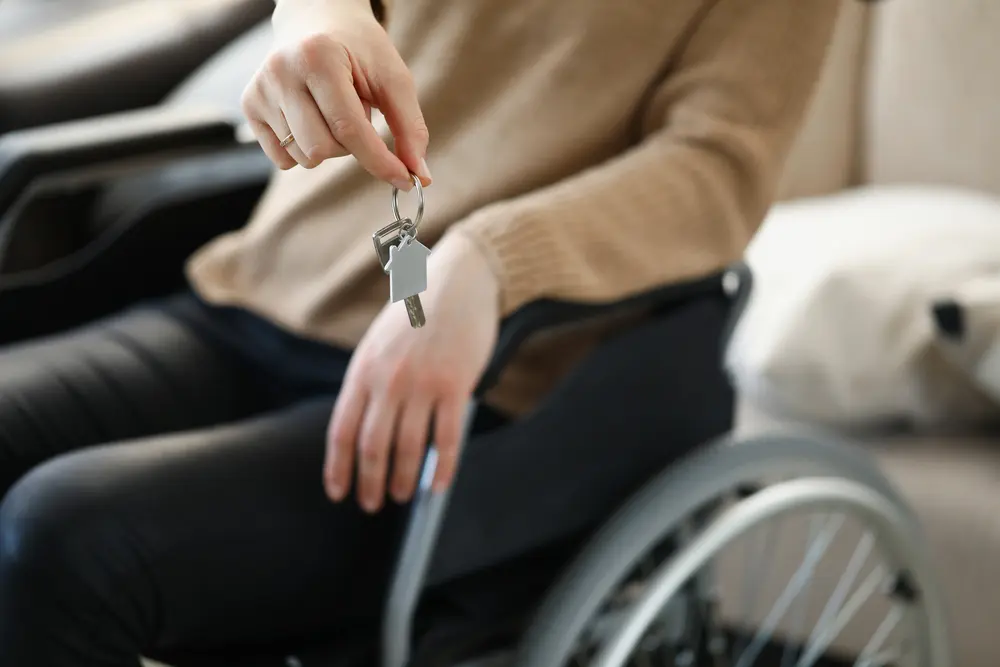Having access to safe and affordable housing is a necessity for everybody. However, non-elderly disabled people sometimes struggle to access affordable housing for themselves.
According to the Annual Homeless Assessment Report, about half a million homeless people who went to shelters last year were found to have disabilities.
The good news is that several programs in the United States provide financial aid for rent to those without age restrictions who have disabilities.
So let’s get started!

Affordable Rental And Housing Options for Non-Elderly Disabled Persons
There are many rental assistance programs for disabled and non-elderly persons, varying by location and government policy.
Some of them are mentioned below.
Section 8 Program – Housing Choice Vouchers for Non-Elderly with Disabilities
Low-income people and their families can get help paying their rent through the Section 8 Program. Those who qualify get a voucher that can be used to pay for part of their rental housing.
The participant’s income, the local rental market conditions, and the size of the family all play a role in determining the level of support. Also, they must be US citizens or eligible immigrants.
Mainstream and Non-Elderly Disabled (NED) Vouchers
Non-Elderly Disabled (NED) Vouchers, or Mainstream Vouchers, usually serve disabled, non-elderly persons at risk of institutionalization due to a lack of affordable and accessible housing. The program has sought to facilitate their reintegration into society through rental assistance since 1997.
Here are some details about the unique NED projects,
- Category 1 Non-Elderly Disabled Vouchers: They allow non-elderly disabled families to find affordable homes on the private market, such as through a property owner.
- Category 2 Non- Elderly Disabled Vouchers: These NED vouchers enable non-elderly persons with disabilities living in nursing homes or other healthcare institutions to move into the community.
Only income-eligible families where the head of household, partner, or co-head is disabled and not over 62 qualify for a NED voucher. Other projects include
- Designated Housing Vouchers: Non-elderly disabled families with a disabled member receive housing assistance in a public housing unit, even if occupancy is restricted to elderly families.
- Certain Development Vouchers: enable non-elderly families with disabled individuals with funding availability who are not currently receiving housing assistance under the National Housing Act, where owners restrict occupancy to elderly families.
Section 811 Supportive Housing
The Section 811 program, also called the Supportive Housing for Persons with Disabilities program, is an effort by the government intended for people with disabilities who can live independently but may require supportive services. It also provides nonprofit sponsors of rental housing with interest-free capital advances for construction, rehabilitation, and acquisition. With no requirement for payment if housing is available for forty years.
To qualify for the rental assistance program, a family’s monthly adjusted income must be at or below 30% of the area’s median income, and one member with a handicap must be 18 or older and younger than 62 and qualify for Medicaid’s long-term, community-based care coverage.
State and Local Housing Assistance Programs for Non-elderly Disabled Families
Numerous local and public housing agencies offer affordable housing for individuals with disabilities. These housing units assist with income-based rent, and selection is determined by income, residency, and criminal record.
A few examples include the Access to Home Program (NY), the Texas Department of Housing & Community Affairs (TDHCA), the Massachusetts Department of Housing and Community Development (DHCD), and the Washington State Housing Finance Commission.
https://youtu.be/oT5tC3YRJQw?si=VyM2U-vGtTsvqcfh
A small video explaining the assistance that can be given to non-elderly disabled people
To safeguard tenants with disabilities, all rental assistance programs have specific rules for eviction. To learn more about it, please refer to the article State-by-State Analysis of Eviction Laws for Disabled Tenants.
Applying To Receive Rental Assistance
First, look for regional Public housing agencies (PHA) in the area or look for them online.
Then, apply to any PHA with an open waiting list. When eligible candidates reach the top of the PHA’s waiting list, they are issued either a specific NED or a regular voucher.
Conclusion
Rental assistance for non-elderly persons with disabilities is more than just financial support; it assures their well-being, inclusion, and the opportunity to lead fulfilling lives despite their challenges.


